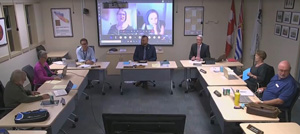Thursday September 24, 2020 | LANGFORD, BC [Updated 11:50 am September 25, 2020]
Editorial analysis | by Mary P Brooke, Editor | Island Social Trends
It’s not often that the gloves come off at SD62 board meetings, but the September 22 meeting was one of those times. For anyone who thinks school board meetings are boring, they’re not.
In light of the pandemic in which ‘outdoors is better than indoors’, Trustee Allison Watson had earlier brought forward a motion (at the September 8 Education Policy Committee meeting) about accelerating a shift to outdoor education (i.e. regular curriculum being taught outdoors).
Even at the Education Policy Committee — chaired by long-time SD62 Trustee Bob Phillips — there was lengthy discussion and skillful work by Phillips to contort the motion so that it was tame and ineffective by the time it reached the board on September 22.
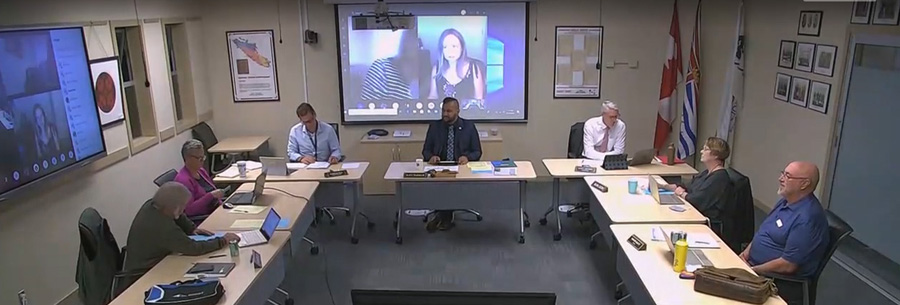
All well and good for trustees to direct the delivery of education in their school district as they see fit. But the reaction against the outdoor education idea was visceral. It met with strong contorted language from Phillips and Trustee Margot Swinburnson on September 8… the sort of tongue twisting that happens when you really have to get a point across without saying right out loud that you’re dead set against the topic at hand.

Rewording of the motion at the September 8 Education Policy meeting ripped the teeth right out of Watson’s motion. It’s not surprising that she was emotionally taken aback and that time, and again at the September 22 board meeting when she arrived with an ‘amendment’ which with skillful board-lingo and working hard with Robert’s Rules of Order, was also rejected in its entirety.
Watson seems not to have done enough lobbying of her fellow board members ahead of either motion (at either meeting), or she did and was not given the straight goods. And she didn’t bring enough backup or validation as preamble to either motion, leaving too much room for objection. Watson did say she’d had lots of “interesting feedback” from people in the community between meetings, but backed down from articulating upon that.
It was hard to watch as Waston left herself open to truly what rolled out as an attack against her motion, but arguably also against her enthusiasm and willingness to explore outside the box.
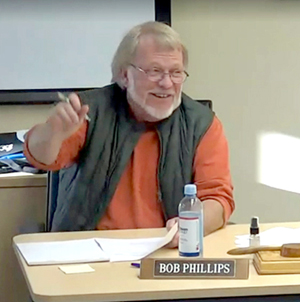
Mostly strongly, it seemed, there was the greatest focused intent to defeat the motion from her two fellow trustees from the Milne’s Landing Zone in Sooke (Phillips and Swinburnson). During debate, Trustee Dianna Seaton tried to soften the blow and guide a retreat for Watson, but that ball didn’t find the net.
Voting on the motion:
And to sear the edges of the wound, Board Chair Ravi Parmar said quite top-down: “I’m taking a vote on this one”. That’s a rare thing, as most motions are agreed upon by consensus by this board. Parmar insisted that every board member loudly and clearly state their position on the watered-down motion that had come through the Education Policy Committee. That brought down the gauntlet in a most indelicate way.
Every single one of the trustees — including Watson herself, trying so hard not to rock the boat — ultimately voted in favour of the motion that will see the whole idea of exploring innovation in the delivery of regular curriculum outdoors sorta kinda given some room in the board meeting archives.
In person at Tuesday night’s meeting were Chair Ravi Parmar, Vice-Chair Bob Beckett and trustees Phillips and Seaton. Attending virtually were Swinburnson and Watson. Trustee Wendy Hobbs was absent from the September 22 meeting.
Objection to the idea:
Objection to the idea was dressed in posturing about overloading staff and wanting to know what the current activities of outdoor education already are. But with the exception of the fully-outdoor Nature K (which as Swinburnson correctly pointed out was researched in considerable detail before its launch), the rest is mostly in the genre of outdoors activities (such as gardens), and outdoor learning (exploration for science classes, or field trips).
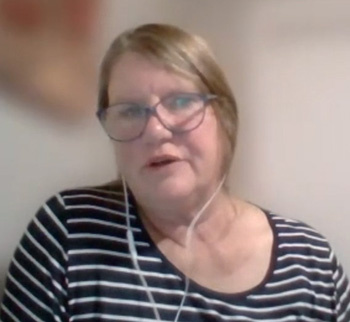
In particular, Swinburnson seemed highly defensive of programs already in place that she seemed to think would be threatened by a board-directed exploration of shifting to outdoor for more curriculum areas. She articulated how the greenhouse manager and ecology teacher at Edward Milne Community School (EMCS) had applied for a grant and so on (which could be part of the Eco Academy that got postponed to Fall 2021 due to the pandemic).
The territorialism and defensiveness by most of the board was starkly gruff and almost frantic when a larger picture was simply proposed for meaningful exploration.
In that Swinburnson had coached Watson as far back as 2011 to run for the SD62 board, completely blockading Watson in such an aggressive fashion was clearly shocking to Watson.
To be fair, Watson’s original detailed lengthy motion was driven, it seemed, more by an emotive response to the pandemic that health officials are now saying will continue for years. As many of us saw on TV news in recent weeks, other provinces are undertaking shifts (to varying degrees) to being outdoors when at school, even in winter weather.
Exploring the idea of outdoor education:
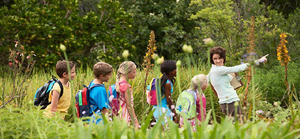
Outdoor education is an idea with legs, but to realize it as a structured way of delivering the BC Curriculum would certainly be a huge undertaking at all levels of education delivery. Trustees could have just said that, and not twist into knots their words. By how the six chose to battle the one, they also damaged their relations with a well-intentioned peer at their board table. Yes, politics can be rough, but somehow this whole episode seemed mishandled and unnecessarily rough.
Granted, Watson didn’t bring to the board table enough information with her preable to her ‘amendment’. All well-intended, but no one has yet taken her aside to teach her the ropes of maneuvering in the tricky waters of advancing change in a very complex setup that is a school district dealing with rapid growth and which in the last few years in particular has been very attentive to not stepping out of bounds.
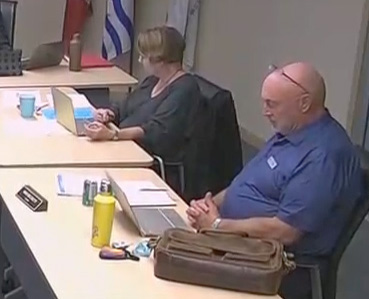
Perhaps there’s a discomfort factor involved with the idea of being at school in the raw elements of nature. The novelty could soon wear off.
But it would, in fact, be interesting to know how well children would learn if they’re worried about rain or cold or wind or super-heat or even smoky skies while in the middle of instruction. Let alone the teachers having to deal with the natural elements while focussing on their professional delivery of curriculum.
One can imagine parents with concerns about extra laundry for the muddy clothes or health concerns about exposure to the elements. And it’s easy to believe that many teens would not ne interested in discarding fashion in favour of outdoor clothing or other protective gear all day long every day.
Underpinning the success of steady curriculum progress would also involve having technologies used outdoors supported by super-reliable wireless availability. There would be travel time considerations for any learning sites off the school property, and all the transportation headaches around that.
But those sort of points could have been made methodically and professionally. Resorting to push-back politics against one of their own was unnecessary.
Island Social Trends tried reaching Trustee Watson for her comment after the September 22 board meeting (via email and LinkedIn), but did not receive a response.
Board dynamics:
Trustee Allison Watson — in her first term in elected office — is arguably the least experienced board member, though former Langford Fire Chief Bob Beckett (despite holding the vice-chair seat) as a first-time trustee also has his rusty moments.
Overall, this board — elected in 2018 — is beginning to lose some of the cohesion that was seen in years prior. Dealing with COVID-related stresses on everyone in the system is possibly partly at play here.
There has also been a change of superintendent in that time. Jim Cambridge retired in 2018, and Scott Stinson is now superintendent.
Nothing ever stays the same, but together with the massive strides forward in planning, budgeting and rollouts like enhanced IT in the last couple of years, there also seems to be room for other agendas to be played out below the radar. Usually they’re done quietly. But not this month.
- Trustees for the Sooke area (Milne’s Landing Zone): Bob Phillips (Chair of the EP Committee), Margot Swinburnson and Allison Watson.
- Trustees for the West Shore area (Belmont Zone – Langford, Colwood, Highlands, Metchosin, and parts of View Royal): Ravi Parmar (Board Chair), Bob Beckett (Board Vice-Chair), Wendy Hobbs, and Dianna Seaton.
- SD62 main info email | School District 62 Superintendent Scott Stinson
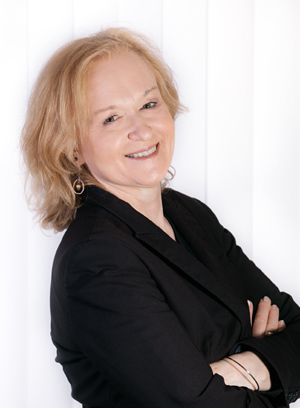
===== About the writer:
Island Social Trends editor Mary P Brooke has been covering SD62 school board politics up close since 2014.


